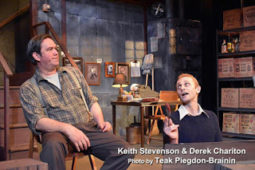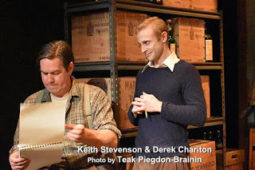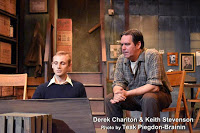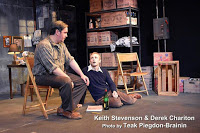Culture Watch – A Delicious “Tomato”

Culture Watch – A Delicious “Tomato”
Sarah A. Spitz4 weeks agono commentAndy WarholAndy Warhol’s TomatoDerek CharitonKeith StevensonPacific Resident TheatreVince Melocchi
 Sometimes the best theatre in Los Angeles comes from the smallest theatres. Pacific Resident Theatre is one of the most consistently excellent theatre production houses in town. Their season opener, “Andy Warhol’s Tomato,” proves the point. The story springs from a legend about the inspiration for the artist’s famous Pop Art Coke bottles, Brillo Boxes and Campbell Soup Can paintings and prints.
Sometimes the best theatre in Los Angeles comes from the smallest theatres. Pacific Resident Theatre is one of the most consistently excellent theatre production houses in town. Their season opener, “Andy Warhol’s Tomato,” proves the point. The story springs from a legend about the inspiration for the artist’s famous Pop Art Coke bottles, Brillo Boxes and Campbell Soup Can paintings and prints.
The story goes that at a local bar near his hometown, Pittsburgh, PA, Andy would draw pictures on cocktail napkins in exchange for free cold Coca-Colas. It’s not true, but Vince Melocchi, the playwright, used to drink at the real bar and heard the story, which forms the basis for his terrific one-act, 80-minute play, featuring Keith Stevenson as bar owner “Bones” (Mario “Bones” Bonino), and Derek Chariton as Andy. They’re both superb and the direction by Dana Jackson couldn’t be better.
 If you didn’t know this was fiction, you’d think you were watching Andy’s origin story. We meet Andy at 18, frail, pale and full of anxiety, who has passed out on the street in front of Bones’s bar, Bonino’s. Bones brings Andy to the basement of the bar to recover, and when he wakes up, they begin to talk.
If you didn’t know this was fiction, you’d think you were watching Andy’s origin story. We meet Andy at 18, frail, pale and full of anxiety, who has passed out on the street in front of Bones’s bar, Bonino’s. Bones brings Andy to the basement of the bar to recover, and when he wakes up, they begin to talk.
Bones is a blue collar guy and Andy is gay, or as Bones initially frames it, “funny.” (This is set in the 1940s, when being gay wasn’t acceptable to society.) Though Warhol’s parents were poor immigrants, he never had any doubt that he would be famous and would live the high life. Bones’s ambitions aren’t that grand.
Andy is about to be kicked out of school if he doesn’t finish the required sketchbook for his remedial drawing class at Carnegie Tech. As weak and sickly as he seems, he’s strongly determined that his aesthetic ideas and talent will carry him far. Bones, meanwhile, spends late nights at the typewriter, writing marketing phrases that he hopes will win him a prize, like the one he creates for Rolling Rock beer.
As Andy begins to explore the basement, he accidentally knocks a picture off the wall, breaking the frame that held it; a frame significant to Bones because it’s irreplaceable. It was made by his father, who’s dead now. Andy’s father died when he was young. Apologetic but confident he’s offering something of equal value, Andy offers to paint a sign that Bones has been wanting to put up above the door of his bar.
 Bones knows what he wants that sign to say and look like, but Andy knows he has a better idea and proceeds to execute his vision. We see the beginnings of the designing mind that will lead him to a career in commercial advertising, before he gains fame in New York as a fine artist.
Bones knows what he wants that sign to say and look like, but Andy knows he has a better idea and proceeds to execute his vision. We see the beginnings of the designing mind that will lead him to a career in commercial advertising, before he gains fame in New York as a fine artist.
Bones manages to sneak a peek at Andy’s sketchbook and Andy is upset. “Great art takes time,” he says. Not much later, when Bones is out of the room, Andy finds Bones’s covered typewriter with pages sitting on top, and takes a few of those pages to read. When Bones later finds out, it infuriates him; more because he doesn’t think he has any talent. Andy disagrees and continues to encourage Bones, in the same way that Bones stays on top of Andy to finish both the sign and his sketchbook.
As a relationship develops between them, Bones offers Andy some very practical advice when he finds himself uninspired; “keep it simple,” and “there’s beauty in the mundane,” Andy in turn tries to persuade Bones that he, too, is an artist. He loves what he’s read of Bones’s work.
Ultimately the bar sign ends up increasing business for Bones, and Andy gains the inspiration he needs from Bones and his coke bottles; before the play ends we understand why it’s called “Andy Warhol’s Tomato.”
Although there is much that is different about who they are as people in the beginning, a real affection, much like a father-son relationship develops between them. And in the end, this is a play about two people who really aren’t so different after all.
 The dialogue is genuine, the acting feels completely natural and the play succeeds on every level. I highly recommend you see this small gem before it’s scheduled to end on September 22.
The dialogue is genuine, the acting feels completely natural and the play succeeds on every level. I highly recommend you see this small gem before it’s scheduled to end on September 22.
Pacific Resident Theatre is located at 703 Venice Blvd., in Venice. Don’t miss this one. Call for tickets at 310-822-8392 or online https://pacificresidenttheatre.com/andy-warhols-tomato/
Sarah A. Spitz is an award-winning public radio producer, now retired from KCRW, where she also produced arts stories for NPR. She writes features and reviews for various print and online publications.
